The INFP Shadow Functions
I’ve had a lot of requests to write more articles about the shadow functions of each type so I decided to go ahead and get into the INFPs shadow functions. INFPs are known for being empathetic, sensitive, imaginative, and passionate individuals. Their four primary functions are as follows:
Dominant function: Introverted Feeling (Fi)
Auxiliary function: Extraverted Intuition (Ne)
Tertiary function: Introverted Sensing (Si)
Inferior function: Extraverted Thinking (Te)
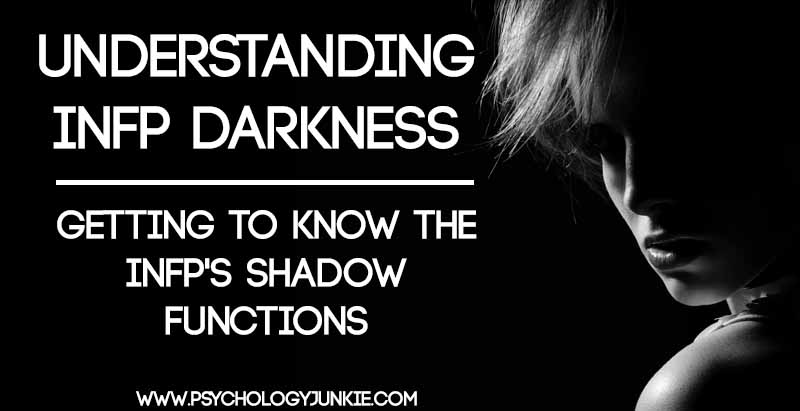
Now let’s take a look at the INFPs shadow functions:
Opposing Role: Extraverted Feeling (Fe)
Critical Parent: Introverted Intuition (Ni)
Trickster: Extraverted Sensing (Se)
Demon: Introverted Thinking (Ti)
Okay, now you might be looking at your computer screen like “what did I just read? demon function? what kind of psycho mumbo-jumbo is this?”. Don’t worry, I’m not saying that you’re actually housing a demon inside you. It’s not time to go and hire an exorcist or anything. So before we start going into the INFP’s specific shadow functions, let’s take a look at what “the shadow” really is!
What Are Shadow Functions?
The shadow functions are the most unconscious part of your personality. You use them unconsciously throughout every day, but you always rely more heavily on your primary functions. Your shadow functions tend to be more apparent, and also more immature, during times of extreme stress, illness, or sleep-deprivation. They also show up at times when you feel you are not “yourself” or when your ego is severely threatened. They also show up in the projections you make about other people. Most people will not identify very readily with their shadow functions because they are the “other”, they don’t “fit in” with your ego.
So what is your ego anyway? We talk a lot about ego in relation to arrogance or pride (“that guy is an egomaniac!”) but the ego really stands for the constructed part of your personality and also your “identity”. When you think about yourself and compose a mental picture of who you are and what you stand for that usually is your “ego”. When your ego feels threatened; when someone makes a judgment about you that doesn’t align with who you believe you are, when you start questioning your own identity, then your shadow can become more apparent and lash out. You also tend to use your shadow when you make inaccurate projections about others.
Are Your Shadow Functions “Bad”?
This is a tricky question, so I’m going to quote Mark Hunziker, the author of Depth Typology: C. G. Jung, Isabel Myers, John Beebe and The Guide Map to Becoming Who We Are in my answer. He calls the shadow functions “ego-dystonic”. He says “Ego-dystonic function-attitudes tend to remain the suppressed, oppositional Other within us…..they work, as do all function-attitudes, to support the well-being of the entire psyche-trying to compensate for the imbalance of an ego-dominated personality.”
So while the shadow functions can show themselves in sometimes uncivilized, irrational ways, they still are there for your well-being and they can be used in a way that is positive. It’s always important to remember that all eight cognitive functions are valuable. None are inherently “bad”.
The INFPs Shadow Functions
So now that we have a relatively good idea of what the shadow functions do, let’s take an in-depth look at the INFPs specific shadow functions.
The Opposing Role: Extraverted Feeling (Fe)
The opposing role acts as the contradictory, less-civilized version of the dominant function. It’s, in essence, the “leader” of the shadow functions. It usually shows up in times when you are defensive, frustrated, challenged, and self-critical. It also is used a lot when we make projections about other people.
In order to understand the opposing role, we need to understand the INFPs dominant function, since it lies in opposition to the opposing role.
As an INFP the dominant function is Introverted Feeling (Fi). Fi is a judging function and INFPs use it to channel information and decide what coincides with their values. They always try to stay in line with what they feel is right, what lines up with their identity, and what is meaningful to them. They are very emotionally rich individuals and very individualistic as well, and Fi has a lot to do with that. Fe, in contrast, is about understanding the emotions of the “other” or the “group”. It quickly notices manners, social constructs, outer emotions, and moods, and wants to maintain harmony. Fe naturally lies in opposition to Fi to a certain extent. Both Fe and Fi want harmony, both are focused on values and meaning, both are empathetic (at their best). However, where Fi is essentially focused on “my values”, Fe is essentially focused on “their values”.
Because Fe doesn’t fall in line with the INFPs ego, they tend to distrust it in other people. It opposes their natural tendencies. They may see Fe-users as “manipulative”, “fake”, and “pushy”. They also may stifle Fe by resisting being pulled into other people’s emotions in favor of focusing on their own. For the most part, INFPs will choose Fi over Fe because this feels like them, whereas Fe feels like a stranger.
An INFP can use Fe in a constructive way; considering the values of the group when making a decision so that harmony is maintained. But it can also be used in a destructive way. When the INFP becomes passive-aggressive and uses other people’s emotions to manipulate them that would be influenced by the opposing role. When an INFP ignores their own values for the sake of a group’s corrupt values, that would be an influence of the opposing role. When an INFP becomes over-concerned with the emotions and reactions of others to the detriment of their well-being that can also be a direct result of the opposing role “stepping in”.
The true nature of the INFP is to be individualistic, to be authentic to one’s self, to do things that feel meaningful and true to their morals and ethics. When people challenge the INFPs values or make a threat to their ego, they may lash out with the opposing role and appeal to external values or the values of “the group” in order to solidify their argument.
The Critical Parent: Introverted Intuition (Ni)
The critical parent lies in direct opposition to the INFP’s auxiliary function; Extraverted Intuition. Some typologists call the critical parent the “Witch” or “Senex”. The critical parent tends to be harsh and hypercritical. It wants to set limits and control, and it defends the ego by belittling and inactivating either oneself or others.
In order to understand how the critical parent works, we need to take a look at the function it opposes, Extraverted Intuition (Ne).
Extraverted Intuition interprets relationships and meanings in the outer world and finds possibilities and potential within those things. It is drawn to theoretical “what if’s” and “could be’s” and desires to find interconnections between seemingly unrelated things. INFPs use Ne when they imagine, brainstorm, consider various possibilities, and are inspired by the outer world.
Introverted Intuition, the INFPs “critical parent” is a function that tinkers with ideas, possibilities, symbols, visions, metaphors in an internalized way. Ni-users (INJs) tend to have “flashes” of insight that appear out of the blue. They are extremely focused on the abstract, and instead of being inspired by the outer world and all the possibilities within that, they are more inspired by the inner, unconscious world. They tend to have a lot of resolve about their vision or hunches and are less focused on exploring similar, unrelated ideas.
Because Ni isn’t as fully developed in INFPs as it is in INJs, they tend to use it in a haphazard or confused way. They might pick up on false patterns or get a “hunch” that something is absolutely going to play out one way when there are really other ways it could go. When INFPs project inaccurate assumptions about other people because they just know they’re true without knowing why, this could be the result of the critical parent. When INFPs set limits on their own plans and dreams because they have a hunch that they will fail, this could be the critical parent at work. The critical parent isn’t always bad, but it does tend to be rather immature. INFPs can use Ni in healthy ways, they may have a positive hunch that something will work out and they can’t explain why. They may experience a sudden, indefinable “vision” that comforts them. However, it’s usually best for INFPs to focus more consciously on developing Ne over Ni.
The Trickster: Extraverted Sensing (Se)
The trickster is a function that’s primary purpose is to manipulate and create paradoxes. It likes to find ways to distort your experiences. INFPs will most often experience this function when they are extremely stressed or their ego is in a state of severe disruption. When Se takes the wheel for INFPs it’s important that they take their perceptions and judgments with a grain of salt. Mark Hunziker says that the trickster “has no respect for rules and no interest in maintaining consistency.” In order to understand how the trickster works specifically for INFPs, we need to understand Extraverted Sensing.
Extraverted Sensing is focused on the external, physical world in the present moment. It is drawn to experience and hands-on interaction. Se quickly notices details in the current situation and is able to adapt to ever-changing situations quickly.
When INFPs use Se, it is usually in a very misunderstood and confused way. They tend to struggle with being aware of their surroundings and can have difficulty monitoring objects and noticing minor details. They may accidentally bump into things more than other types or get so lost in their mind that they lose touch with what’s happening around them.
When the trickster shows it’s mischievous side, it often catches the INFP off-guard. It’s as if an unwelcome guest has suddenly entered their psyche. They may misread current details and lose touch with their normal far-reaching vision. They may point to concrete reality in haphazard ways to get people off their back (calling out random facts and details as proof for something theoretical and unproven). They can become impulsive, reckless, or focused on the moment at the expense of the future or their ideals and dreams.
The Demon: Introverted Thinking
This is the shadow function that feels the most foreign to the INFP. As Mark Hunziker says, “Essentially, it’s our inferior inferior.” When we see other people using this function (even in a positive way) we tend to see it as negative. It’s generally the function that carries with it the most shame and we try to avoid acknowledging it as part of ourselves. This all sounds very negative, but when someone passes through the “demon” and is able to address this part of themselves (not necessarily work on advancing it, but acknowledge it) they can usually experience great personal growth and maturity.
The demon has its name because it tends to show its face during the most crippling periods of our lives. If this period isn’t handled properly it can lead to immense self-destruction and destruction of relationships. Usually, when we act in the mindset of the demon we regret it later. When INFPs are “in the grip” of Ti, they become overly obsessed with systematizing things, or they may try to apply cold, hard logic to arguments and define and re-define terms. Over time they may begin to feel more and more flustered and will try to tear apart existing models and frameworks to prove that they are inconsistent. They may also become increasingly self-critical and focused on their own logical inconsistencies and failures.
Should We Try to Develop Our Shadow Functions?
Generally speaking, you shouldn’t try to spend a lot of time developing your shadow functions. You should acknowledge them, learn about them, and try to understand them. But spending a great deal of time trying to use them can push you into their grip and can cause you to become imbalanced and stressed. You’ll want to work on developing your primary functions much more because these are the areas that will promote the best growth. The most important reason to understand and study your shadow functions is so that you can become aware when you’re falling into their control. Knowing that you’re projecting their negative traits on others, or that you’re experiencing things in an untrustworthy way can help you to take a step back, consider what these shadow messages are conveying, and determine whether they really line up with the truth.
The INFP and Stress
What Are Your Thoughts?
Please feel free to share any ideas or knowledge you might have on this subject in the comments!
Find out more about your personality type in our eBooks, Discovering You: Unlocking the Power of Personality Type, The INFJ – Understanding the Mystic, and The INFP – Understanding the Dreamer. You can also connect with me via Facebook, Instagram, or Twitter!
Other Articles You Might Enjoy:
Understanding INFJ Darkness – Getting to Know the INFJ’s Shadow Functions
10 Surprising Truths About INFPs
This article contains affiliate links. I only recommend products I truly believe in.


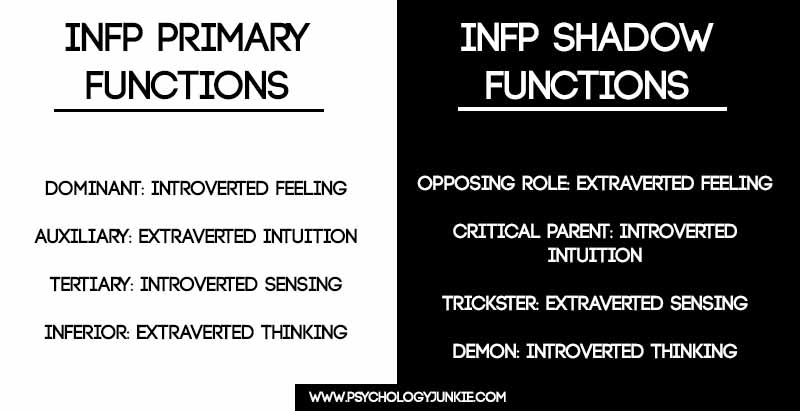





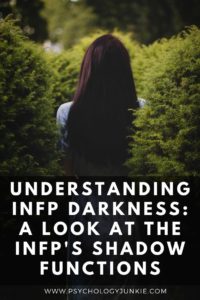





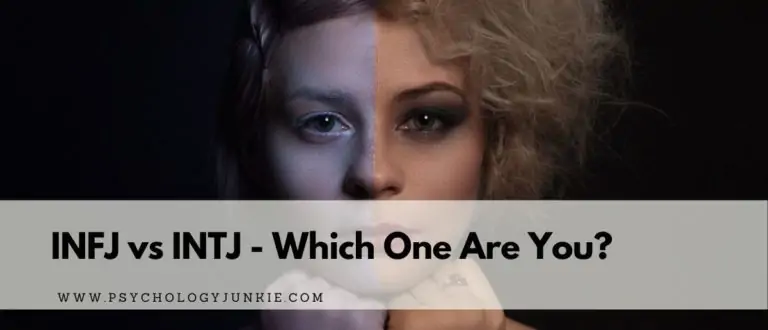
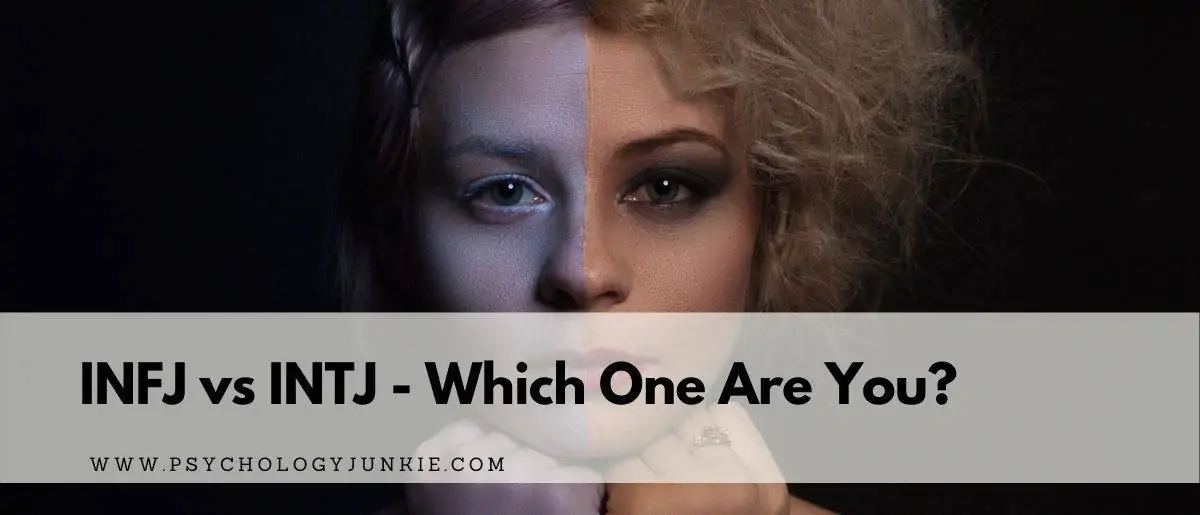




Very interesting, thanks (it’s a lot, this is all I can say now) 🙂
I think those who read this and find it overly negative might want to check out Socionics, an alternative to MBTI. INFPs are INFjs or Ethical Intuitive Introtims (EIIs).
While the other four functions might not be “valued” they are definitely not demonic. We use them all the time to varying degrees are are sometimes a source of growth.
That’s very interesting! As an INTP I can relate to Ni and Se. And it’s interesting to know why it can be so difficult to deal with Fi-dom!
I guess you don’t want to allow people to print this? My printer will only allow landscape printing of the documents, which I think is the result of settings you ascribe to the doc. Is there a reason? Thanks for the information.
Hi there! I have no problem with people printing this, there must be a setting on my theme that’s causing a problem. I will try to look into it!
I’m not sure you’ve got the shadow functions down right. – INFP’s as introverted feelers can never be extroverted feelers. The shadow is the misuse of the inferior extroverted Thinking, or other words the INFP looks like a very unhealthy ESTJ. What you’ve painted here is to suggest INFP’s become ENFJ’s when in their shadow….but and INFP resembling an ENFJ would be impossible as they don’t have those functions available. Instead, what we do have available is a reversal of the functional stack, not an inversion
The shadow functions in this article are addressing John Beebe’s 8 function model of type, which is something that’s used in a lot of the Typology books now. I have heard the term of getting in the “grip” of the inferior function as being in the shadow, but that’s a different type of shadow. Not many sites cover the 8-function model of type, but if you’re interested in knowing more a good book is “Depth Typology” by Mark Hunziker. Hope that helps!
Can you do one of these for INTPs?
Yep! I’m hoping to get one of these done for each personality type 🙂
Very interesting! I shall print out to study.
This may be at the root of why I find relationships with ENFJs the most tricky? Also while in my previous job I did (among other things) technical writing, and I think that used Ti a lot. I had to double and triple check to make sure my thinking was right. The end result was good, but it was *hard work*!
I heard some alternative names for the 4 unconscious functions that made sense and were easy to remember (developed by an ESTJ). I’ll see if I can track them down…
You’ll have to let me know what you think! I can totally understand that would be hard work! I find it very difficult to use Te as an INFJ so I can imagine Ti would be hard for an INFP! Let me know if you ever come across the alternative names, I’m really curious about them 🙂
Im so thrilled i was able to find this. I’m an INFP and its articles like these that help me learn more of myself and get me motivated for school and stuff.
Wow, just WOW! I wish I knew all this 25 years ago!! I will definitely be looking into this more. Thanks!
I’m so glad you found this helpful!! Thanks for the feedback! 🙂
Thank you Susan. I love your work as I find it to be very balanced and helpful. I’ve read that Jung suggested not delving into the shadow aspects too much, but then I read others who promoted developing the shadow sides. As an INFP, I know how in the past when I developed my weakest function, life was not fun! I was glad to see that you recommended understanding these shadow functions but not trying to develop them too much. Thank you so much for your incredible work.
This article is misleading. All types make mistakes before their functions are fully developed. Much depends on gender as well. Most 40ish INFPs will have fully developed functions yet maintain the ability to grow mentally until late in life. Meanwhile INFJ’s reach their peak early and are unable to steer clear of their well worn path. Because of this they think they are superior to everyone else and work tirelessly to preach useless disciplines in the effort to make the entire world INFJ. The only thing worse is a schizoid.
I am currently displaying only my shadow functions, how do I become idealistic and arty and free again?
What helped me is remembering what I loved doing as a child and start there. Drawing and painting for the fun of it. Climbing trees. Skipping stones. Jumping on my mini trampoline. Dancing wildly in the living room. Whatever makes your heart sing! All the best to you <3
very interesting
I wish there were a link to this article for other types I have difficulty finding it for some types
Wow very accurate for me. Thank you💚
Thanks, Susan. This article is helping me (an INTJ) understand my INFP sister better.
Wow! Incredible insight into myself and my shadow self! Blown away with the accuracy. Am super curious about learning why your shadow may be showing up often as I can see it can intrude on your ego self and cause confusion around your type etc
I have an infp friend who is very particular about what other people say about her. For example, if someone showed her a theory about infps and how they view others, then she would be critical of every word. I’m pretty sure this is Fi at work, but part of me is thinking there’s something else at play. Is this one of the shadow functions? If so, which one?
That sounds more like an enneagram 4 than INFP. There is definitely overlap because many INFPs test as enneagram 4.
I am recently tested as INFP with high Ti and really low Te. Is this dangerous? How can I improve my Te function? Thank you!
Tldr
Much of this matches my own experience as an INFP. But I’d correct certain points that don’t quite fully capture the INFP motivation. What you’re describing in this article would be more accurate for an extremely immature person.
Dominant Fi isn’t so much about individualism as it’s about subjectivity, and even inter-subjectivity. It’s not just the individual’s own subjectivity, as it seeks out the subjectivity of all things. The Fi view senses everything as possessing an inner truth and essence.
So, an INFP is likely to bypass Fe. It seems superficial, untrustworthy, or inadequate. They want to go straight to the heart of an issue, another individual, a group, or whatever. The INFP wants to know what is the inner experience and motivation, not just their own.
Then again, as I said, a less well developed INFP might get stuck at an self-obsessed level of dominant Fi as mere individualism. But I don’t know how common it would be for INFPs to get stuck in that mentality. One of the natural skills of an INFP is cognitive empathy, which is going to naturally pull them out of themselves.